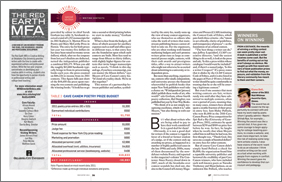Poets & Writers Magazine welcomes letters from its readers. Please post a comment on select articles at www.pw.org/magazine, e-mail editor@pw.org, or write to Editor, Poets & Writers Magazine, 90 Broad Street, Suite 2100, New York, NY 10004. Letters accepted for publication may be edited for clarity and length.
READING THE NUMBERS
Thank you for sharing the nitty-gritty of writing contests in an artful cover story woven through with personal anecdotes and numbers. The  line-item expenses of the writing contests featured in “The Economics of Competition” by Michael Bourne (May/June 2012) were refreshing, eye-opening, and a kick in the pants. I was dismayed to see that each contest mentioned operates at a deficit. We literati pride ourselves on cultural literacy, but what of financial literacy? Money is the great unspoken in the life of an artist, but now that you’ve pried the lid off the coffer, let’s delve in, familiarize ourselves with what’s inside, and make sure there is enough to keep us going.
line-item expenses of the writing contests featured in “The Economics of Competition” by Michael Bourne (May/June 2012) were refreshing, eye-opening, and a kick in the pants. I was dismayed to see that each contest mentioned operates at a deficit. We literati pride ourselves on cultural literacy, but what of financial literacy? Money is the great unspoken in the life of an artist, but now that you’ve pried the lid off the coffer, let’s delve in, familiarize ourselves with what’s inside, and make sure there is enough to keep us going.
Laura Silver
New York, New York
COMPETITION REVISION
Your special section on writing contests (May/June 2012) revealed a major flaw in the competition model. The bulk of the reading of entries seems to be done by first readers, many of whom, I assume, are graduate students. That puts older writers at a considerable disadvantage. We all tend to favor literature that resonates with our own experiences, and the experiences of older people are far less likely to resonate with young first readers. I would suggest the role of first readers be limited to rejecting submissions that are clearly unworthy of consideration. Judges, who have more life experience, should read all the rest.
Paul Marx
Towson, Maryland
INDOMITABLE SPIRIT
Two articles appear back-to-back in your May/June 2012 issue that summarize every writer’s conundrum. In “When Patience Pays Off” by Kevin Nance, fifty-three-year-old Ben Fountain, whose first novel was about to be published, says he sees an “absurd and pathetic aspect” to publishing a debut at his age, noting, “I should be much farther along.” Turn the page to “The Necessary Distance” by Michael Bourne and we’re in the world of Nell Freudenberger, who found herself subject to public criticism for being too young -- and too good-looking, to boot -- when her first book of stories was published in 2003. It seems you can’t win for losing in the literary world, at least if you internalize other people’s opinions. Let’s hope we can keep celebrating the indomitable forces that drive us to creation, rather than acknowledging the critical voices that insist we are unworthy of our work.
Roberta Werdinger
Ukiah, California
LITERATURE AS LEGACY
Chris Huntington’s “Why We Write: You’re Not Alone” (May/June 2012) speaks to the point that writing, while a solitary act, always has an interpersonal context. The author’s greatest poem or story to his son may be his actions, not his words, but still, writing is a central means of passing on in language, symbol, and story a thread that connects families, friends, and lovers through time.
Nick Mazza
Tallahassee, Florida
EXTRACURRICULAR CRAFT
Thank you for J. T. Bushnell’s article “The Jerks: Creating Sympathetic Characters” (May/June 2012). As a fledgling writer who didn’t find her calling until long after college, I missed the opportunity to learn creative writing skills in school. To teach myself, I’ve read more books than I have shelf space for -- but none were as immediately inspiring as Bushnell’s article, which gave me new perspective on developing substantial characters. I can’t wait to get back to my writing.
Linda Folsom
Los Angeles, California






